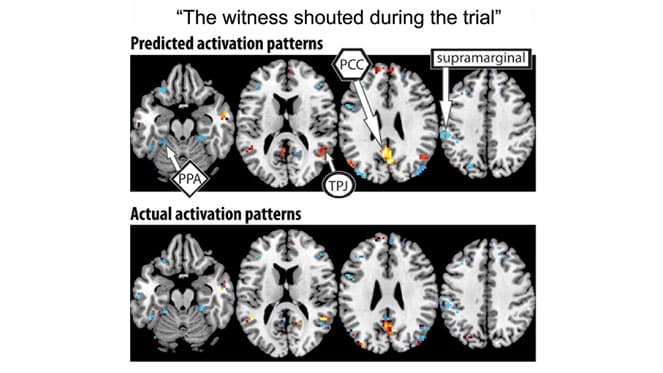New AI technology successfully ‘Reads Mind’ for decoding complex human thoughts
In a path breaking research, scientists from Carnegie Mellon University, USA, have developed a novel brain imaging technology that can read minds and identify complex human thoughts with 87 per cent accuracy. The technology relies on the use of machine learning algorithms to mind read. The study offers a new evidence that the neural dimensions of concept representation are universal across people and languages.

The scientists have finally been successful in developing a way to see complexity of human thoughts in the fMRI signal. Discovery of this correspondence between thoughts and brain activation patterns could thus effectively tell us what the thoughts are built of, according to Psychology professor Marcel Just, the lead author of the study.
The new study demonstrates that the brain’s coding of 240 complex events, sentences like the shouting during the trial scenario uses neurally plausible semantic features, consisting of features, like person, setting, size, social interaction and physical action. As each type of information is processed in a different brain system, by measuring activation in each brain system, the program can tell what types of thoughts are being contemplated.
 For seven adult participants, the researchers used a computational model to assess how the brain activation patterns for 239 sentences corresponded to the neurally plausible semantic features that characterized each sentence. The program was able to decode the features of the 240th left-out sentence with 87 percent accuracy, despite never being exposed to its activation before. The algorithm was even able to achieve the reverse feat- that of being given prior sentence information and then correctly predicting the activation pattern in the brain for the same.
For seven adult participants, the researchers used a computational model to assess how the brain activation patterns for 239 sentences corresponded to the neurally plausible semantic features that characterized each sentence. The program was able to decode the features of the 240th left-out sentence with 87 percent accuracy, despite never being exposed to its activation before. The algorithm was even able to achieve the reverse feat- that of being given prior sentence information and then correctly predicting the activation pattern in the brain for the same.
This advance makes it possible for the first time to decode thoughts containing several concepts-which is what most human thoughts are composed of. For researchers the next step would be to decode the general type of topic a person is thinking about for charting out a map of all the types of knowledge in the human brain.
A paper describing the work is published in the journal#-Link-Snipped-#.
Source:<a href="https://www.cmu.edu/dietrich/news/news-stories/2017/june/brain-decoding-complex-thoughts.html" target="_blank" rel="nofollow noopener noreferrer">www.cmu.edu</a>

The scientists have finally been successful in developing a way to see complexity of human thoughts in the fMRI signal. Discovery of this correspondence between thoughts and brain activation patterns could thus effectively tell us what the thoughts are built of, according to Psychology professor Marcel Just, the lead author of the study.
The new study demonstrates that the brain’s coding of 240 complex events, sentences like the shouting during the trial scenario uses neurally plausible semantic features, consisting of features, like person, setting, size, social interaction and physical action. As each type of information is processed in a different brain system, by measuring activation in each brain system, the program can tell what types of thoughts are being contemplated.

This advance makes it possible for the first time to decode thoughts containing several concepts-which is what most human thoughts are composed of. For researchers the next step would be to decode the general type of topic a person is thinking about for charting out a map of all the types of knowledge in the human brain.
A paper describing the work is published in the journal#-Link-Snipped-#.
Source:<a href="https://www.cmu.edu/dietrich/news/news-stories/2017/june/brain-decoding-complex-thoughts.html" target="_blank" rel="nofollow noopener noreferrer">www.cmu.edu</a>
0



